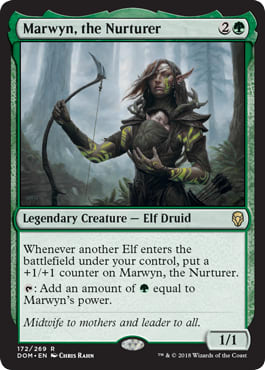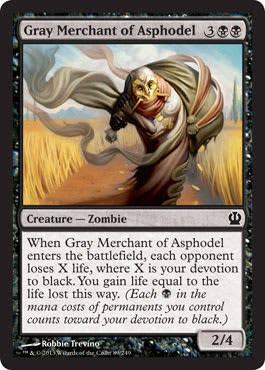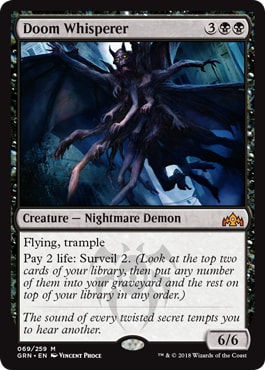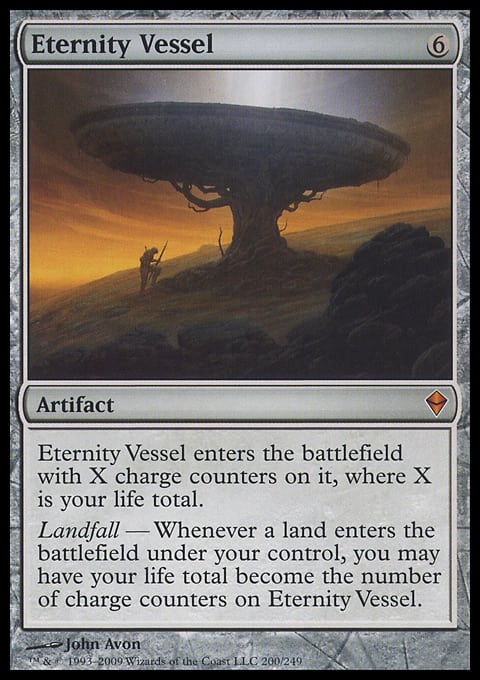In a recent column I found myself exploring how I might build a Rayami, First of the Fallen deck using Birthing Pod to control what creatures I have available to exile with Blood Counters. As I worked my way through the article I found my optimism that the deck would be able to compete with the other decks I frequently play against steadily dwindling. The build was going in a Voltron direction but Rayami doesn't come with any ways to make such a plan particularly effective. If Rayami got two or even a paltry one +1 to his power for each keyword he had gained from his exiled creatures, that would have been enough to make the deck strong enough to be excited about. Instead I found myself adding janky equipment like Hero's Blade to try to pump him up to the point where she might be a threat.
I was building around a theme, not building towards a win condition.
Today's column isn't about Rayami, nor is my goal to complain about how Rayami could have been so much better. I'm going to explore my deck-building process and how my focus or lack of focus when building around a commander translates fairly directly into wins and losses when I play that deck.
I don't much enjoy playing decks that barely have even a puncher's chance at winning games. When I build around a theme and don't include a specific combo or synergy that is powerful enough to be called a wincon I often end up with that kind of deck. These weaker decks usually rely on generating value, chipping away at my opponents and playing politics in order to get to the finish line first. They can be fun, but they usually aren't that powerful.
I sometimes build decks around specific game-winning interactions that either combo or create a ton of value with their innate synergy. Rayami was a theme build, but my Marwyn, the Nurturer deck started out quite explicitly as a combo deck. The goal was to generate a ton of mana and use mana sinks to turn that mana into a win. Marwyn won a ton of games and is now one of my favorite decks even though it's a bit too powerful for me to break out on "casual night".
For the purposes of today's column, I'm going to talk about games as journeys. My destination or goal is almost always to win the game. You can build decks with other goals, but I'm almost always trying to win, even if I'm not trying very hard.
The Journey
When I'm building a deck with my focus on the journey, I'm usually starting with an idea, a theme or even just a card or two. In the end I have a fully formed 100 card deck, but my decisions along the way weren't usually about how to win the game as much as they were about making the theme work or generating value out of how my cards will interact.
An example might be to build a Knights deck not by identifying a specific wincon but by trying to assemble an interesting and synergistic list of Knight creatures and support cards that when played together should allow me to present a threat on the battlefield. Even if every deck should have a way to win the game, I'm usually not focused on how to do that outside of just including cards that work with my theme. Coat of Arms might be able to win me the game with my tribal deck, but it relies on a lot of other things to fall into place to actually do so.
When I built Rayami, I set up a spreadsheet so that I could do a good job of including a decent spread of creatures and keywords. I spent a lot of time thinking about how to get him a lot of keywords and included enough removal to give him a puncher's chance at competing at a casual table. I included a lot of important things but didn't bother to add any combo wincons. My current build of Rayami will never just win the game if a certain two or three cards are on the field together. It's not that kind of deck, and that's OK.
When I built Niv-Mizzet Reborn, I also used a spreadsheet - this time to try to make sure I had a good spread of 2-color cards so that Niv's enter-the-battlefield trigger would have a good chance of drawing me a lot of cards. This kind of planning is fun and really does make for a better deck. My first Niv-Mizzet Reborn build was great at drawing cards and I always enjoyed seeing how many different guild cards I'd get when he hit the table.
Maximizing the synergy around a commander's ability can be a challenging and fulfilling way to build decks, but it doesn't always translate to having a winning deck. These decks can be a lot of fun, but when I play the deck later on I often find that it's underpowered and can't win as often as I'd like.
With Rayami, my early findings have been that he just never poses much of a threat and the effort involved in setting up his keywords doesn't translate to winning games. My sample size is fairly small, so I haven't given up on him yet, but I'm not optimistic that he's going to start kicking butt anytime soon.
With Niv-Mizzet Reborn, I really enjoyed being able to draw lots of cards but unless I had Ramos, Dragon Engine on the field already, I didn't often have the mana to turn that into a push to win the game. Unsurprisingly, Niv got much better when I rebuilt it around Food Chain, but the deck's early games were as a 2-color Dragon Tribal deck. The initial goal was to maximize card draw, play Dragons and win through combat.
Winning through combat is a fine goal, but unless you've got a specific plan on how to quickly get to lethal damage on the table or even on a single person, I don't really consider it a win con. It's what you do in Commander or at least in casual Commander. You go to the Red Zone. You jump into the trenches and duke it out with your buddies. It's a way to win, but it's not really a "wincon".
The Destination
If my goal is to try to win the game, why don't I enter into every build with a clear plan for how the deck will actually win games?
For me, the answer is complicated. I like to win games, but I also value having a good experience when playing Commander. I often play with friends who want longer, more casual games. A deck that is designed to try to win by combat through establishing and removing threats and swinging for damage is really perfect for that kind of experience.
When I build decks specifically around one or more wincons, I find that I often just resort to building combo engines or ways to trigger powerful synergies to win the game. They wind up being fun to play but less fun for a lot of people to play against. The game becomes about trying to survive and get the right cards to be able to win, and opponents often feel blindsided. It's a different feeling than just smashing creatures together and some of the folks I play with regularly have a strong preference for combat-oriented decks over combo.
I build a lot of decks. I am actually really happy to build decks whose plan involves winning on the battlefield in a relatively "fair" manner. Those decks can be fun but are rarely as effective at winning games as combo or "high synergy" decks.
When I build around a wincon, I'm building my deck with the destination in mind. There's no vague intention of trying to eventually amass an army or build up enough commander damage. I have a very specific plan and often I have fallback plans in case I need them.
My Marwyn, the Nurturer deck is a great example of starting with the destination in mind. Staff of Domination and Marwyn can generate infinite mana. It's easy to find backups for either half of that combo. Sword of the Paruns and Priest of Titania do the same thing. Redundant combo pieces make it easy to land your combo - especially if one of those is your commander. From there, it's easy to find ways to pour infinite mana into a variety of permanents and spell to create infinitely wide armies and/or infinitely large creatures. I added in some ways to generate big mana without going infinite so I'd have some options if I wasn't able to land the combo.
Unsurprisingly, the deck was a ton of fun to play and she won a lot of games. As I mentioned earlier, I no longer play my Marwyn deck on casual night.
The Bruna Paradox
Another great example of different ways to focus on deck-building comes from Bruna, Light of Alabaster.
Bruna has an attack trigger that allows her to steal enchantments from other creatures, out of the graveyard and out of her controller's hand. If you were approaching this deck as a theme to build around you might think that playing a ton of enchantments is the way to go. The more you have out, the more powerful she'll wind up being, right?
That can work and can be very powerful, but if you were to build her around a clear and efficient win con you might instead identify three or four key auras that will let her kill an opponent in one swing. That sort of focus on winning opens up slots in your deck so that you can run more removal, counterspells and card draw to make your deck even more difficult to deal with.
Why kill someone with 10 enchantments attached to Bruna when all you need is two or three?
The answer, of course, is because it's fun!
It's also less efficient and will result in a weaker deck even if it feels like it's a stronger, better deck. Maybe this "less is more" approach to winning with Bruna isn't really a paradox, but I think it rings true. Run the right auras, focus on winning over just building to a theme and you'll probably wind up having a much more effective deck.
A really good example of this second approach from my own deck-building is a list I recently put together around Yarok, the Desecrated.
Gary's Bounce House
If I had built Yarok with my focus on the journey, I would have been focusing on value cards first and foremost.
I would have gone after all the best enter-the-battlefield cards in Sultai (![]()
![]()
![]() ) colors. When I build around value I'm trusting that if I can squeeze enough value out of a deck, things will probably work out for me. I think there's some truth in that, but value really isn't a substitute for a clear and effective wincon.
) colors. When I build around value I'm trusting that if I can squeeze enough value out of a deck, things will probably work out for me. I think there's some truth in that, but value really isn't a substitute for a clear and effective wincon.
Instead of building around generic value for Yarok, I identified a very strong enter-the-battlefield card that can just win games under the right circumstances. I then built the deck around that card, possibly making it a bit of a glass cannon in its first draft. A look back at my column about Core Set 2020 "Sidekicks" reminded me that I called out this combination quite early on. At the time I didn't know I would actually build the deck, but that's just what I've done.
Yarok is 3/5 Elemental Horror who costs ![]()
![]()
![]()
![]() to cast. He's got Deathtouch and Lifelink but his party trick is that he's a walking, talking Panharmonicon. If a permanent entering the battlefield would cause a triggered ability of a permanent you control to trigger, it triggers an additional time. If you've got Panharmonicon out, you don't get double the triggers, but you will get an additional trigger.
to cast. He's got Deathtouch and Lifelink but his party trick is that he's a walking, talking Panharmonicon. If a permanent entering the battlefield would cause a triggered ability of a permanent you control to trigger, it triggers an additional time. If you've got Panharmonicon out, you don't get double the triggers, but you will get an additional trigger.
Rather than going for generic ETB value I decided to split my planning into three colors - Black, Green and Blue - and to focus each color almost exclusively on one goal. I know that's a little strange, but in retrospect I think that's why I was attracted to the idea in the first place.
The Black cards are mostly about establishing a high devotion to Black. That means getting as many Black mana symbols as possible onto the field. I focused really heavily on deathtouch creatures because most folks won't swing into deathtouch blockers. I also run tutors and my win con, Gray Merchant of Asphodel. "Gary" will cause my opponents to lose life equal to my devotion to Black and I'll gain that much life. Gray Merchant of Asphodel will see itself so if we can get Yarok and 7 other Black mana symbols on the field we'll be hitting each opponent for 20 life.
The Green cards are almost all about putting lands onto the field, though Riftsweeper also makes an appearance in case I need to get Gary back from exile.
The Blue cards should probably have included counterspells, but instead I went after flicker/bounce effects. It doesn't take much Black devotion to kill a table with a kicked Rite of Replication targeting Gray Merchant of Asphodel if Yarok is out. Just having Yarok and a Vampire Nighthawk would give you 5 devotion and would cause 5 (Gary damage) x 2 (Yarok) x 5 (Rite) = 50 life loss!
The trick with this deck is to try to time it so that I can get my Gary damage in before anyone wipes the board. I also have to be careful to not get Gray Merchant countered, but I'm running some recursion so I can bring him back from the graveyard if necessary.
Early results have been good. I've won more than my fair share of games and the deck's losses have come from having an opponent use Sorin Markov to set me from a ridiculous life total back down to 10 life. I'm honest enough to admit that the Sorin player might find my Gary shenanigans every bit as cheesy as I find his Sorin Markov activations, but the real question is why I didn't have ways to respond to or recover from that.
Decks are rarely ever "done" and my Sorin losses have taught me that I need ways to deal with effects like Sorin's that will set my life to a low number. If I'm able to shoot my life total up over 40 or even over 100, it makes sense to run ways to use that to my advantage. These cards aren't in my deck yet, but they're on my radar and will probably get added eventually.
Unspeakable Symbol is an enchantment that will let me turn my life points into +1/+1 counters to more easily finish off anyone who survived my Gary shenanigans. Doom Whisperer will let me pay my life points to Surveil. That means I can dig to whatever card I like. It might not save me from Sorin, but if I've got a way to draw a card and I'm running Disallow I could always Surveil until I get to my counter and then counter Sorin's activated ability. Eternity Vessel will gain counters equal to my life total and when I play a land I can set my life total back to that number again. It's not a quick answer but Eternity Vessel does give me a chance to recover from a Sorin or a Magister Sphinx.
I won't always have these in hand or on the field when I'm faced with a Magister Sphinx or Sorin Markov, but having them in my deck is an essential bit of preparation that I should do anyways. I take some comfort in knowing that my deck has an answer to a problem even if I don't have that answer when I need it. At least it was in there somewhere.
The Decklist
This is a relatively early list and hasn't seen many changes yet but it has also been winning games so I don't have that much to "fix" in it yet. It was built with cards I had lying around and probably a few cards that got swapped out of other decks. It isn't meant to be a competitive list, but should perform well in a casual environment.
Gary's Bounce House | Commander | Stephen Johnson
- Commander (1)
- 1 Yarok, the Desecrated
- Creatures (31)
- 1 Archetype of Finality
- 1 Blightsoil Druid
- 1 Bloodhusk Ritualist
- 1 Burglar Rat
- 1 Caligo Skin-Witch
- 1 Doom Whisperer
- 1 Dusk Legion Zealot
- 1 Fetid Imp
- 1 First-Sphere Gargantua
- 1 Gifted Aetherborn
- 1 Gravedigger
- 1 Gray Merchant of Asphodel
- 1 Gruesome Scourger
- 1 Hand of Silumgar
- 1 Hired Poisoner
- 1 Malakir Familiar
- 1 Nekrataal
- 1 Noxious Groodion
- 1 Pharika's Chosen
- 1 Phyrexian Rager
- 1 Pit Keeper
- 1 Rancid Rats
- 1 Ravenous Chupacabra
- 1 Riftsweeper
- 1 Rune-Scarred Demon
- 1 Sheoldred, Whispering One
- 1 Shriekmaw
- 1 Sire of Stagnation
- 1 Thrill-Kill Assassin
- 1 Typhoid Rats
- 1 Vampire Nighthawk
- Instants (10)
- 1 Aether Tradewinds
- 1 Aetherize
- 1 Echoing Truth
- 1 Just the Wind
- 1 Naturalize
- 1 Peel from Reality
- 1 Retraction Helix
- 1 Unsummon
- 1 Vampiric Tutor
- 1 Wildwood Rebirth
- Sorceries (14)
- 1 Broken Bond
- 1 Cultivate
- 1 Demonic Tutor
- 1 Diabolic Tutor
- 1 Fade into Antiquity
- 1 Far Wanderings
- 1 Grow from the Ashes
- 1 Kodama's Reach
- 1 Nature's Spiral
- 1 Rampant Growth
- 1 Reanimate
- 1 Rite of Replication
- 1 Search for Tomorrow
- 1 Twilight's Call
- Enchantments (1)
- 1 Phyrexian Arena
The deathtouch blockers in this list are actually meant to be something of a rattlesnake effect. I really care about my devotion to black, so I'm unlikely to use them to block. My opponents will probably not want to risk swinging into them, but the reality is that I'll take damage for a while before using them because I'm expecting to gain any lost life back when Gary jumps into the bounce house.
If the folks in my meta figure out what I'm up to, they may start saving up counterspells or playing Torpor Orb or Hushwing Gryff to try to mess with my game plan. When and if that happens I'll have to adjust this list to be able to deal with those challenges. I'm in Black, Blue and Green so I have access to plenty of great cards that can help me and if I wanted to make the deck more competitive I would absolutely move the deck in that direction.
Final Thoughts
Rayami wound up being a "beater" deck that I can pull out on casual night and know I'm unlikely to crush the table, and Yarok wound up being a fairly powerful deck that can come out of nowhere to bring a table to its knees.
Does that mean that building around a win con inevitably leads to a stronger "combo" deck and building around general themes will always leave you with a deck you'll be disappointed in?
I don't think so.
My Niv-Mizzet deck was so much fun that after taking it apart over a month ago I actually put it back together again. It still has Food Chain in it, but what I most enjoyed was seeing how often I could reveal 10 cards and put 5 or 6 in my hand. I also enjoyed the fact that I was running ten 2-color cards that could be cycled to go get lands. It was a weird way to build the deck, but it made me happy and I remember seeing other Niv-Mizzet Reborn decks generate much less card draw than I was usually able to get. The addition of a Food Chain package and a few outlets for infinite creature mana made it able to win games, but my list is pretty far from being a "cEDH" deck.
I think the reality is that most of my builds aren't exclusively done around a theme or around a wincon. They're usually a mix. I have noticed that when I build around a win con, it usually winds up being a combo deck of some sort. When I build around a theme it usually winds up trying to win by combat and by squeezing as much value as possible out of the cards I'm playing.
If you're finding that your decks aren't winning enough, try to shift your focus.
Nearly everyone likes to win, but not everyone focuses on building their decks around wincons. Make sure it's realistic, isn't too convoluted, and you can protect it and then make sure you have backup plans.
If you want a deck that's fun, isn't going to overpower tables, and that you can get pleasure out of even if you're not winning that often, then find a theme that you'll really enjoy and just start exploring it. Try to add synergy and value, but don't build it with a combo finish or some other "dirty" wincon if you don't want to win games that way.
This has been a bit of a ramble, but thanks for joining me and I hope you enjoyed the journey and the destination! I expect to be writing about new legendary creatures from Throne of Eldraine next.
Thanks for reading and I'll see you next week!


































